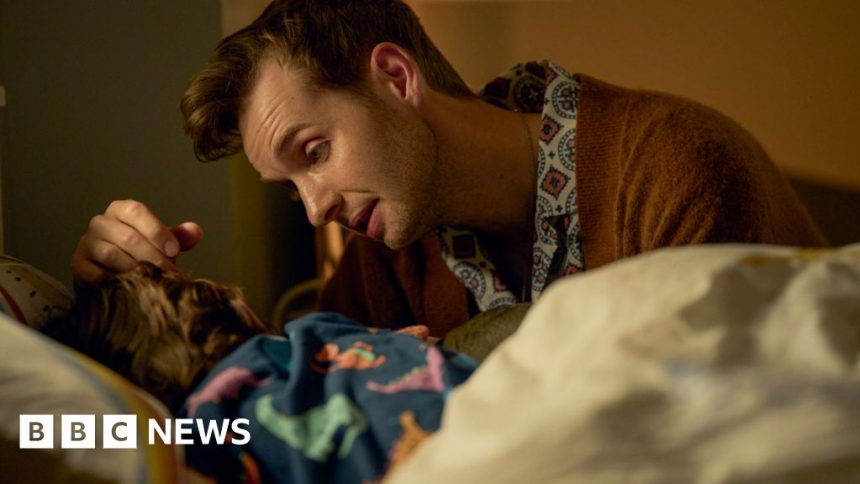Lost Boys and Fairies: ‘My husband and I cried like a baby watching it’
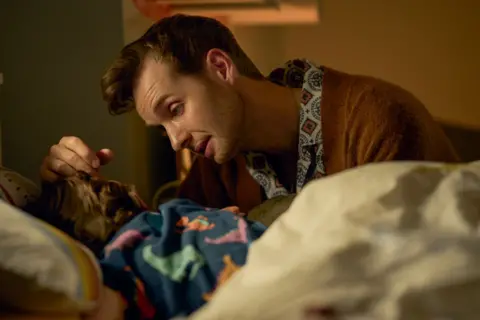 Duck Soup Films
Duck Soup FilmsAfter the success of BBC drama Lost Boys and Fairies, series writer Daf James shares his own experience with adoption – and fans say how the series reflects the real-life issues they’ve faced in building a family.
Since BBC drama Lost Boys and Fairies aired earlier this month, critics have praised the “quiet melancholy” and “raw honesty” of the series.
One reviewer called it “extraordinary”, saying: “It’s a story about when people collide with each other and try to build a family out of all of their various parts.”
The three-part series tells the story of performance artist Gabriel (played by Sion Daniel Young) and accountant Andy (Fra Fee) who decide to adopt. The pair are forced to confront many of their own traumas from childhood as they gear up to become parents.
The drama draws inspiration from the real-life experience of writer Daf James and his husband.
And for real-life adopters, who saw part of their own lives unfold on the show, watching the series was especially poignant.
‘Rollercoaster of emotions’
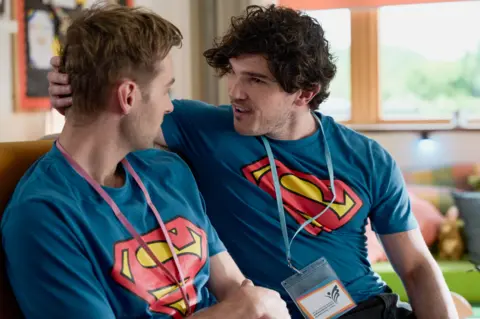 Duck Soup Films
Duck Soup FilmsMorgan and his husband, Derry, are trying to adopt their first child. They recently finished the BBC series and were astounded at how the show conveyed lots of what they’re currently experiencing.
“The adoption process is a rollercoaster of emotions,” says Morgan. “But Lost Boys and Fairies captured it perfectly. It was spot on.
“My husband and I cried like a baby watching it.”
From their first date, Morgan and his now husband connected over wanting a child. They both considered other options, but adoption really “resonated” with them both.
Three years on, they’re weeks away from being assessed at a panel where they could be approved as adopters.
Like the protagonists of Lost Boys and Fairies, they’re now attending activity days in the hopes of bonding with a child they could then be matched with.
“It’s a really strong feeling [going into that environment] because you go there with the intention to find a child, but the kids are there to play,” says Morgan.
In the show and in real life, prospective adopters can attend activity days and meet up to 30 children waiting for adoption.
It’s “challenging”, Morgan says, because there is no guarantee that adopters will automatically be matched with the child they choose.
‘Attention to detail’
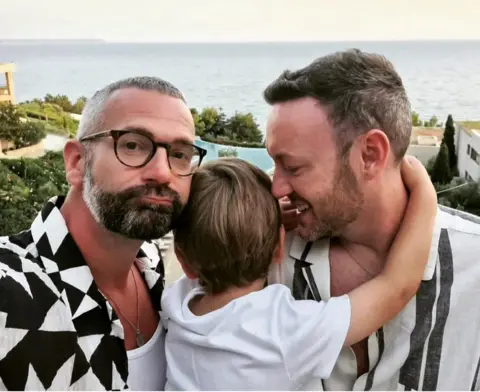 Peter Hunt
Peter HuntFor adoptive parent Peter Hunt, the power of the show was how accurate the small details were. He and his husband Andrew adopted their first child in 2019, and found the series brought back memories of their experience.
“Andrew and I were laughing at their tidying,” he says. “You spend days beforehand preparing for your social worker to come round because you think it’s a representation of you, or something you might be judged on.
“So it was the small attention to detail and I think the level of humour that you have when you are in that process that really resonated when watching.”
Another scene that stood out to him was when Gabriel and Andy had found a child they wanted to move forward with, they both were then given the child’s file, including details of their family home and the reasons why they were in local authority care.
“It’s very hard to read in written form how much trauma these children have been through in such a short period of time in their early lives,” he says.
“So you have to develop a bit of a thick skin when you’re reading those stories to be able to understand or even attempt to understand that trauma and how you might parent a child that’s been through that.”
‘Life is messy’
“I’ll always advocate for my adoption experience,” says Cardiff-based writer and composer, Daf James, who created the series.
“Even though I’d seen adoption on screen, I’m not sure if I had necessarily seen it authentically represented in the way that I was experiencing it,” he adds.
Last year, the Department of Education reported that one in five adoptions in England were by same-sex couples.
Jenny MacQuire, from charity Adoption Matters, says: “Sexuality isn’t an important factor when it comes to adoption. What is important is the commitment, resilience, stability and love that children who have suffered early childhood trauma need.”
When Daf and his husband made the decision to adopt, they had several friends and acquaintances around them that had already followed that route into parenting.
But there wasn’t a huge amount of culture or media coverage around adoption, let alone on gay couples, says Daf.
“There were definite highs and massive lows – of course there are, this is life and life is messy.”
‘Significant neglect and abuse’
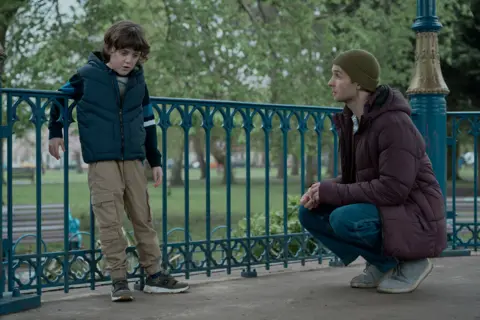 Duck Soup Films
Duck Soup FilmsOne of the main challenges is the trauma a child has potentially faced, Daf explains.
Around 3,000 children are adopted every year, says Alison Woodhead from charity Adoption UK.
“Most of them will have experienced significant neglect and abuse in early childhood, and many will experience a number of moves in care before being placed for adoption,” she says.
Daf says “there’s a lot of grief and loss that children encounter in adoption, and that’s all part of the parcel, but we were brilliantly supported by social services”.
One particular high point in his adoption journey stands out.
After adopting his two boys, Daf and his partner were at the beach, as the children shrieked and sprinted around.
Up until then, everyone in the family was still feeling the difficulties of the new transition but something shifted in that moment for Daf, he remembers.
He felt a wave of assurance wash over him and he knew things wouldn’t always feel tough.
“There will be moments where the joy grows,” Daf says.
Sources of support related to adoption are available via the BBC Action Line.



